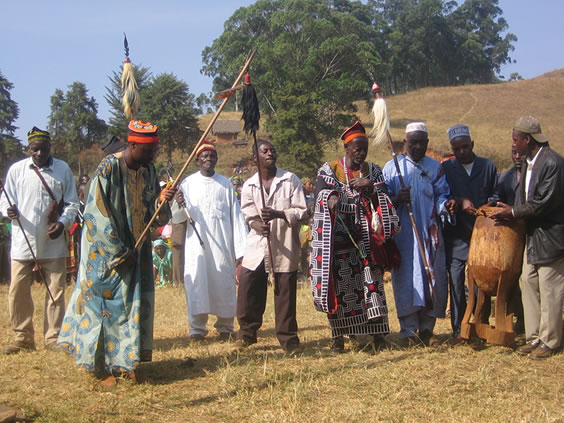July 2019, The case of good persons must be judged in a similar way as that of bad ones. Gikuyu (Kenya) Proverb
 |
Ciira wa mwega utuo ta wa muuru. (Gikuyu) Kesi juu ya wazuri na wabaya zitilie usawa zinapokatwa. (Swahili) Le cas des justes, doivent être jugé dans la même façon que seul des malices. (French) The case of good persons must be judged in a similar way as that of bad ones. (English) |
Gikuyu (Kenya) Proverb
Background, Meaning and Everyday Use
The Kikuyu Ethnic Group is the largest Bantu community group in Kenya, one of the three East African countries. They live mainly in the country’s Central Province, although they are also found in other parts of the country. They practice mainly farming and business.
The use of proverbs today is limited because of lack of spontaneity in local situations and the less frequent application of them to daily life. The elderly people use them naturally in conversation, but they are rarely used by the young generation. Writers, teachers, and the Christian churches are making efforts to change this by creating awareness in the usage of proverbs in the different ethnic languages of Africa through the social media, radio and television, books, journals and theater.
The theme of this proverb is fairness, equality and inclusiveness and is originally related to the communal legal cases connected to land and business in Kenya. The Kikuyu are associated with the belief that they like having money and wealth. These are interests that can lead to disputes easily. Therefore, the Gikuyu proverb emphasizes that all cases should be handled with fairness – regardless of who is right or wrong. The moral teaching is that fairness must always prevail in all cases/decisions irrespective of one’s status in society.
Ciira wa mwega utuo ta wa muuru. English translation: The case of good persons must be judged in a similar way as that of bad ones. Thisis the version of the Gikuyu-speaking people from Kiambu, Kenya. In his book Under One Roof: Kikuyu Proverbs Consolidated (No. 26, page 17) Dr. Gerald Joseph Wanjohi states this proverb as: Ciira wa mwega utuaga (another variant is utuagwota) wa muuru. English translation: The case of a good is judged in the same way as that of a bad. Thisis the version of the Gikuyu-speaking people from Nyeri, Kenya. While there is a variation in the wording, the meaning and the concept remains the same.
Biblical Parallels
Proverbs 31:9: “Open your mouth, judge righteously; defend the rights of the poor and needy.”
James 2:1-5:“My brothers, show no partiality as you hold the faith in our Lord Jesus Christ, the Lord of glory. For if a man wearing a gold ring and fine clothing comes into your assembly, and a poor man in shabby clothing also comes in, and if you pay attention to the one who wears the fine clothing and say, ‘You sit here in a good place,’ while you say to the poor man, ‘You stand over there,’ or, ‘Sit down at my feet,’ have you not then made distinctions among yourselves and become judges with evil thoughts? Listen, my beloved brothers, has not God chosen those who are poor in the world to be rich in faith and heirs of the kingdom, which he has promised to those who love him?”
Hebrews 6:10: “For God is not unjust so as to overlook your work and the love that you have shown for his name in serving the saints, as you still do.”
Psalm 106:3: “Blessed are they who observe justice, who do righteousness at all times.”
Contemporary Use and Religious Application
The Kikuyu community, and in particular those living in rural areas (mainly the older generation), has a habit of using proverbs and sayings to communicate information that is often not understood by the young people in the society. This particular proverb has underlying similarities in the Bible teachings. Numerous biblical verses based on fairness, equality and inclusiveness are well articulated in the Bible.
This Gikuyu proverb on fairness has many applications to the modern legal system in Kenya today. Every person accused of a crime should have their guilt or innocence determined by a fair and effective legal process. Without fairness during a trial, trusting in the government and in the rule of law collapses. The right to a fair trial is recognized by the international community as a basic human right. The right to freedom of worship is a human right enjoyed in many African countries. People choose a modern religion or a traditional cultural worship because it is a right. However, there are controls on cults and denominations that have unacceptable doctrines, and it is only fair to protect the people from such.
The Christian churches in modern society apply proverbs in the religious teachings given to their congregations to help these local communities understand these teachings easily and appreciate them. In some communities of the world we have the African Mass whose teachings, music and décor are African oriented.
Francis Njuguna
Nairobi, Kenya
0720-434819
0782-350649
Email: osnjuguna@yahoo.com
Photographs provided by:
Cephas Yao Agbemenu,
Department of Fine Arts,
Kenyatta University,
P.O. Box 43844,
Nairobi, Kenya,
Cellphone: +254 723-307992
Email: cyagbemenu@yahoo.com
